Crossway Apologetics Collection (10 vols.)
Digital Logos Edition
Overview
Grow in confidence as you learn how to proclaim the truth in a postmodern society from experts in the field. In this age of skepticism, how do we defend our faith? How do we share the truth with people who don’t believe that truth exists? Christians from all eras of history have faced difficult questions and challenges to their faith. This collection contains primary source texts from pioneering apologists and contemporary works that will equip you with the foundational apologetic tools to strengthen and defend your faith.
Work through the historical and physical evidence supporting claims of Christianity. William Lane Craig and Norman L. Geisler provide helpful volumes surveying the wide field of Christian apologetics, while Nancy Pearcey and Charles B. Thaxton provide a more focused volume covering the relationship between science and faith. Whether you are looking for answers yourself or preparing to discuss your faith publicly, the Crossway Apologetics Collection will reinforce your beliefs and provide you with the tools to clearly and articulately witness to others.
- Offers both classic and contemporary apologetics texts
- Equips believers to clearly and intelligently approach nonbelievers
- Presents General and focused apologetic content from world-class scholars in one collection
- Title: Crossway Apologetics Collection
- Publisher: Crossway
- Volumes: 10
- Pages: 3,894
- Christian Group: Reformed
- Resource Type: Monographs
- Topic: Philosophy and Apologetics
- Can You Believe It’s True? Christian Apologetics in a Modern and Postmodern Era by John Feinberg
- Christian Apologetics Past and Present: A Primary Source Reader: Volume 1, To 1500 edited by William Edgar and K. Scott Oliphint
- Christian Apologetics Past and Present: A Primary Source Reader: Volume 2, From 1500 edited by William Edgar and K. Scott Oliphint
- Covenantal Apologetics: Principles and Practice in Defense of Our Faith by K. Scott Oliphint
- The Genesis Factor: Probing Life’s Big Questions by Jon M. Dennis and David R. Helm
- I Don’t Have Enough Faith to Be an Atheist by Norman L. Geisler and Frank Turek
- Reasonable Faith: Christian Truth and Apologetics by William Lane Craig
- Reasons for Faith: Making a Case for the Christian Faith edited by Norman L. Geisler and Chad V. Meister
- Reasons We Believe: 50 Lines of Evidence That Confirm the Christian Faith by Nathan Busenitz
- The Soul of Science by Nancy Pearcey and Charles B. Thaxton
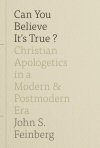
Truth? Can we know it? Today, many people say we can’t. This paradigmatic shift to relativism presents a direct challenge to a Christian’s witness. In this comprehensive treatment, noted scholar John Feinberg argues that truth is both real and knowable, offering a robust guide to Christian apologetics for engagement with our world today.
Many Christians are unprepared to answer the postmodern notion that truth is unknowable and hence ultimately unimportant. That premise refutes itself, of course, but for those already steeped in existential and postmodern ways of thinking, self-defeating propositions are standard fare, and even the simplest truths can seem elusive. Persuading those who love darkness and revel in contradiction can be quite a challenge. Dr. John Feinberg is uniquely qualified to untangle the knots of modern and postmodern thought, pointing us to a better way of understanding truth in the clear light of Scripture. This is an extremely helpful study.
—John MacArthur, pastor, Grace Community Church, Sun Valley, California
John Feinberg meets the challenge of modern skepticism head on, with the full confidence that Christianity is rational and defensible in the marketplace of ideas. Your mind will be stretched and your faith strengthened when you read this book.
—Erwin W. Lutzer, senior pastor, The Moody Church, Chicago, Illinois
John Feinberg’s book is an insightful, thoughtful, and thorough analysis of the modern and postmodern mindsets and a guide on how to engage them. In addition to astute treatments of traditional apologetical themes, such as the Gospels’ reliability and religious pluralism, this volume incisively engages skepticism, truth, and knowledge quite unlike the standard texts in apologetics. Carefully-argued, yet quite readable, Feinberg’s book has much to offer the expert, the novice, and those in between.
—Paul Copan, Pledger Family Chair of Philosophy and Ethics, Palm Beach Atlantic University
John Feinberg is one of the most perceptive Christian thinkers of our time. In Can You Believe It’s True? he affords an accessible and helpful guide for pastors, ministerial students, and laypersons about how to articulate the truth of Christianity effectively in our postmodern era.
—Steve Lemke, provost and professor of philosophy and ethics, New Orleans Baptist Theological Seminary
This volume by John Feinberg presents a more extensive range of subjects than many apologetics textbooks. Beginning with truth and the modern-postmodern debate, Feinberg wades into waters that are explored too seldom in this context but that perhaps include the most gems. Other topics include a detailed investigation of apologetic methodologies, along with specific issues such as the problem of evil, the reliability of the New Testament text, Jesus’s resurrection, and pluralism and tolerance. Each is discussed with understanding and insight. While this is the thorough treatment one would expect from Feinberg, its accessible and relaxed tone gives it a sense of a conversation throughout. I recommend this enjoyable text that can be used at more than one level . . .
—Gary R. Habermas, distinguished research professor, Liberty University and Theological Seminary
John S. Feinberg is professor of biblical and systematic theology and chairman of that department at Trinity Evangelical Divinity School. He is the author of several books, including Ethics for a Brave New World (with Paul D. Feinberg) and The Many Faces of Evil, and is general editor of the Foundations of Evangelical Theology series.
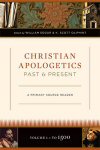
The apostle Peter tells us always to be ready to give a defense to anyone who asks us to account for our hope as Christians (1 Peter 3:15). While the gospel message remains the same, such arguments look different from one age to another. Christian Apologetics Past and Present: A Primary Source Reader: Volume 1, To 1500 is an unprecedented anthology of apologetics texts with selections from the first century AD through the Middle Ages. This first of two volumes, edited by William Edgar and K. Scott Oliphint, features primary source documents from the time of the early church (100-400) and the Middle Ages (400-1500). Featured apologists include Aristides, Justin Martyr, Irenaeus, Tertullian, Origen, Athanasius, Augustine, Anselm, and Thomas Aquinas. The authors also provide a preface to each major historical section, with a timeline and a map, and an introduction to each apologist. Each primary source text is followed by questions for reflection or discussion purposes.
The texts here assembled are ‘classics’—not in the sense that they answer all legitimate questions about Christianity, but that, when they were written, they made their readers think hard about the faith, and that they continue to do so today. This is a most worthy collection.
—Mark A. Noll, Francis A. McAnaney Professor of History, University of Notre Dame
Bill Edgar, one of evangelicalism’s most valued scholars and apologists, has given us in this work with Scott Oliphint a classic destined to be used for generations. I highly recommend it to all who are called to defend the faith.
—Charles Colson, founder, Prison Fellowship and the Colson Center for Christian Worldview
This collection is superbly done and will bring much needed wisdom to our own times.
—David F. Wells, distinguished senior research professor, Gordon-Conwell Theological Seminary
For years I have wanted a book of primary sources in apologetics to use in my classes. Now we have an excellent one in this volume.
—John M. Frame, J.D. Trimble Chair of Systematic Theology and Philosophy, Reformed Theological Seminary, Orlando, Florida
Edgar and Oliphint have skillfully selected the best pre-Reformation sources. Their volume, the first of two, fills a gap in scholarly resources and highlights the strength, wisdom, and solidity of defenders of the faith in earlier times.
—J.I. Packer, board of governors’ professor of theology, Regent College
William Edgar (DTheol, University of Geneva) is professor of apologetics and coordinator of the apologetics department at Westminster Theological Seminary. His books include Reasons of the Heart, The Face of Truth, and Truth in All Its Glory.
K. Scott Oliphint. (PhD, Westminster Theological Seminary) is professor of apologetics and systematic theology at Westminster Theological Seminary in Philadelphia and has written numerous scholarly articles and books, including God With Us. He is also the co-editor of the two-volume Christian Apologetics Past and Present: A Primary Source Reader and Revelation and Reason: New Essays in Reformed Apologetics.
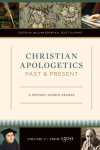
Volume 2 of Christian Apologetics Past and Present takes a sweeping look at apologetics from the Reformation to the present. Readings from 26 apologists, including Martin Luther, John Calvin, Blaise Pascal, Jonathan Edwards, Søren Kierkegaard, Francis Schaeffer, Alvin Plantinga, and William Lane Craig are included. With editorial commentary and questions for reflection, this is a valuable text for both students and people interested in defending their faith.
In an age of historical amnesia such as ours, nothing could be more helpful than to know how the church, in its long march through time, has addressed the opponents of Christian faith. This collection is superbly done and will bring much needed wisdom to our own times.
—David F. Wells, distinguished senior research professor, Gordon-Conwell Theological Seminary
This series on the classical traditions of Christian apologetics is, to my knowledge, unmatched in basic compendia. It will equip and encourage thoughtful Christians to develop equally compelling defenses of the faith in our post-Enlightenment, post-Romantic, post-Postmodern era where global interdependencies plunge many into new varieties of suspicion, contempt, and hostility that demand reasonable and faith-filled encounter, dialogue, and debate.
—Max L. Stackhouse, Rimmer and Ruth de Vries Professor of Theology and Public Life Emeritus, Princeton Theological Seminary
Understanding apologetics as explicating, affirming, and vindicating Christianity in the face of uncertainty and skepticism, Edgar and Oliphint have skillfully selected the best primary sources to introduce us to this ongoing task. Their work fills a gap in scholarly resources and highlights the strength, wisdom, and solidity of the prominent defenders of our faith.
—J.I. Packer, board of governors’ professor of theology, Regent College
William Edgar (DTheol, University of Geneva) is professor of apologetics and coordinator of the apologetics department at Westminster Theological Seminary. His books include Reasons of the Heart, The Face of Truth, and Truth in All Its Glory.
K. Scott Oliphint. (PhD, Westminster Theological Seminary) is professor of apologetics and systematic theology at Westminster Theological Seminary in Philadelphia and has written numerous scholarly articles and books, including God With Us. He is also the co-editor of the two-volume Christian Apologetics Past and Present: A Primary Source Reader and Revelation and Reason: New Essays in Reformed Apologetics.
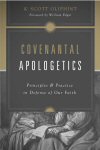
Defending your faith can be daunting, and a well-reasoned and biblically grounded apologetic is essential for the challenge. Following in the footsteps of groundbreaking apologist Cornelius Van Til, K. Scott Oliphint presents an introduction to Reformed apologetics, also referred to as presuppositional apologetics. This book clearly explains the theological foundations of covenantal apologetics and illustrates its application in real-world conversations with unbelievers—helping Christians to boldly and knowledgeably proclaim the gospel.
A major undertaking in Christian apologetics, this volume makes a most timely and welcome contribution. By labeling the apologetic task ‘covenantal,’ Scott Oliphint highlights throughout that the presuppositions of ‘presuppositional apologetics’ are the clear and indubitable teachings of Scripture and not a postmodern understanding of presuppositions. Comprehensive in its scope, this balanced mix of principles and practice provides valuable instruction to a broad range of readers. I commend it most highly, especially to those concerned with responding to the challenges of unbelief, both present and perennial, in growing fidelity to Scripture as God’s Word
—Richard B. Gaffin Jr., professor of biblical and systematic theology, emeritus, Westminster Theological Seminary
In a day marked by shallow thinking, weak reasoning, and arguments lacking in both theological and biblical depth, Oliphint offers an arsenal of apologetic insight. His affirmation and exposition of a covenantal apologetic brings a vital biblical and theological dimension to the apologetic task. Believers seeking to give an answer for the hope that is in us will enthusiastically receive this book.
—R. Albert Mohler Jr., president and Joseph Emerson Brown Professor of Christian theology, The Southern Baptist Theological Seminary
As a teacher I have been crying out for an apologetic primer that would help to demystify a presuppositional method, demonstrate the exegetical and biblical-theological basis for this method, and give some idea as to what this might look like in the real world with real people. Oliphint’s Covenantal Apologetics fills this need. It is not only principled and practical, but pastoral. For those looking to give reasons for hope, I recommend it.
—Daniel Strange, academic vice principal and tutor in apologetics, Oak Hill College, London
Covenantal Apologetics is carefully written, with close attention to detail. It is clear, compelling and cogent. I recommend it to every careful student of this important subject.
—Douglas Wilson, senior fellow of theology, New St. Andrews College
In attempting to put to rest the term ‘presuppositional,’ Oliphint integrates the best insights from his philosophical expertise in the Westminster Seminary tradition with the best insights from the Westminster Assembly theological tradition. The result: a book that aims at both the mind and the heart. As a pastor, I welcome books that offer a consistently Reformed approach to a defense of Christianity, for they are few and far between. This may be the best one yet.
—Mark Jones, senior minister, Faith Vancouver Presbyterian Church
K. Scott Oliphint. (PhD, Westminster Theological Seminary) is professor of apologetics and systematic theology at Westminster Theological Seminary in Philadelphia and has written numerous scholarly articles and books, including God With Us. He is also the co-editor of the two-volume Christian Apologetics Past and Present: A Primary Source Reader and Revelation and Reason: New Essays in Reformed Apologetics.
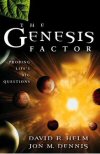
Here is a book for all who have a healthy uncertainty about life’s big questions—Where did I come from? Is there a God? Does this God care about me? The authors believe that the answers are found where Christianity began—with the introduction of God and his work in the book of Genesis. Using the Socratic method, they challenge readers to wrestle with Scripture itself rather than with systematic questions. This candid conversation with Genesis is an ideal apologetic for today’s postmodern culture.
Jon M. Dennis is cofounding pastor of Holy Trinity Church in downtown Chicago. Since moving to the city with his family in 1998, he has helped establish various ministries including Hope for Chicago, the Charles Simeon Trust, and the Chicago Partnership for Church Planting.
David Helm serves on the pastoral staff of Holy Trinity Church, a multi-congregational church in Chicago. In addition he is the executive director of The Charles Simeon Trust, which partners with churches to train men for gospel ministry. In this capacity, he leads workshops on biblical exposition to promote practical instruction in preaching.
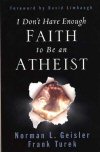
I Don’t Have Enough Faith to Be an Atheist argues that Christianity requires the least faith of all worldviews because it is the most reasonable. The authors lay out the evidence for truth, God, and the Bible in logical order and in a readable, non-technical, engaging style. A valuable aid to those interested in examining the reasonableness of the Christian faith, Geisler and Turek provide a firm challenge to the prior beliefs of doubters and skeptics.
Norman L. Geisler is author or coauthor of some sixty books, including The Baker Encyclopedia of Christian Apologetics, the four-volume Systematic Theology, and many more. He has taught at the university and graduate level for nearly forty years and has spoken or debated in all 50 states and in 25 countries. He holds a PhD in philosophy from Loyola University and now serves as president of Southern Evangelical Seminary.
Frank Turek is a well-known Christian apologist and conference speaker. He holds a DMin in apologetics from Southern Evangelical Seminary.
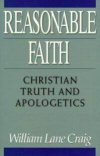
The best choice for a rational and systematic defense of Christianity. This expanded edition covers the existence of God, the problem of miracles, the claims of Christ and other topics.
William Lane Craig (PhD, University of Birmingham, England) is a research professor of philosophy at Talbot School of Theology, Biola University.
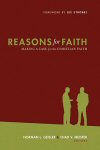
While witnessing for your faith, you often encounter difficult questions and challenges to your beliefs. How should you respond? Editors Norman Geisler and Chad Meister understand the challenges of answering questions about the Christian faith. Their book, Reasons for Faith, gives believers grounded biblical apologetics to help them defend their faith. By both illustrating the importance of apologetics and applying them to popular culture and theological issues, Geisler and Meister provide Christians with the tools they need to share their faith in today’s society.
Reasons for Faith, edited by Norm Geisler and Chad Meister, is a handbook for defending the biblical worldview that every pastor should have on his desk and every thoughtful layperson could study with benefit. This is a timely and timeless book.
—Charles Colson, founder, Prison Fellowship and the Colson Center for Christian Worldview
Norman Geisler and Chad Meister have gathered together many of today’s top apologists in Reasons for Faith, a fresh, new book that serves as an excellent resource for anyone seeking answers regarding matters of faith. Well-documented, yet accessible for the everyday reader, this book sets a new standard for collaborative writing in the area of apologetics. I highly recommend it!
—John Ankerberg, president and founder, The Ankerberg Theological Research Institute
The church today faces a bewildering array of issues that challenge the truth or plausibility of Christian claims. Reasons for Faith provides an informative and helpful response to many of these issues. Even those who may not agree with every argument or conclusion will benefit from careful reading of this significant work.
—Harold A. Netland, professor of philosophy of religion and intercultural studies and the Naomi A. Fausch Chair of Missions, Trinity Evangelical Divinity School
Chad Meister and Norm Geisler have delivered a tour de force for apologetics in Reasons for Faith, a treasure trove of rich apologetical information addressing a myriad of relevant subjects. For saints and seekers alike, this is a must read and an apologetics classic in the making.
—R. Phillip Roberts, president, Midwestern Baptist Theological Seminary
Provides just the formidable, relevant, wide-ranging, and winsome defense of the faith necessary to equip any believer to participate effectively in today’s marketplace of ideas.
—Hank Hanegraaff, president, The Christian Research Institute
Norman L. Geisler is author or coauthor of some sixty books, including The Baker Encyclopedia of Christian Apologetics, the four-volume Systematic Theology, and many more. He has taught at the university and graduate level for nearly forty years and has spoken or debated in all 50 states and in 25 countries. He holds a PhD in philosophy from Loyola University and now serves as president of Southern Evangelical Seminary.
Chad V. Meister is director of philosophy at Bethel College in Indiana. He formerly headed up the Defenders Ministry at Willow Creek Community Church.
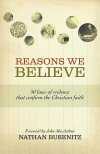
Reasons We Believe will reinforce your personal faith and will provide you with a clear, concise, evangelistic tool to help you share that faith with others. In an age of cynics and skeptics, Christianity is constantly under attack. Believers need resources that defend the veracity of their faith, and Nathan Busenitz provides them. Reasons We Believe confirms and strengthens the faith of believers by demonstrating the reliability of the twofold authority on which Christianity rests: the Word of God and the person of Jesus Christ. This study both reinforces the faith of Christians and provides them with a straightforward evangelistic tool for reaching non-Christians.
A wholesome, faith-affirming volume. It will appeal to Christians who recognize many of the convictions they hold regarding the Christian faith, but who have not seen this many reasons all organized carefully under one cover.
—Gary R. Habermas, distinguished research professor, Liberty University and Theological Seminary
Comprehensive and concise, qualities one rarely finds in the same volume. The book maintains a remarkable focus on Scripture itself. It shows how Christians can make use of traditional evidences and arguments within the Bible’s own framework of thought.
—John M. Frame, J.D. Trimble Chair of Systematic Theology and Philosophy, Reformed Theological Seminary, Orlando
One of the most helpful apologetic guides to appear in a long time. Hugely helpful and highly recommended!
—Ron Rhodes, president, Reasoning from the Scriptures Ministries
We live in a day when authors prostitute their scholarship to become rich on sensationalist books about so-called ‘lost Christianities’ and ‘lost Scriptures.’ Nate Busenitz’s sane and sound treatment of Christian evidences comes as a breath of fresh air.
—William Varner, professor of biblical studies, The Master’s College
Nathan Busenitz serves as an associate pastor and assistant to John MacArthur at Grace Community Church in Sun Valley, California. The author of numerous articles and books, Busenitz also teaches at The Master’s Seminary and is the managing editor of Pulpit magazine.
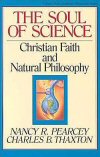
This book surveys the development of science so that Christians may gain an understanding of its historical progression in light of their faith. It looks at science in its formative stages when Christianity was the backdrop to virtually all scientific discussion and then explores the key controversies that over the years have changed the face of science, including past revolutions in math and physics, and the biological revolution that is currently underway.
Nancy Pearcey is a well-known Evangelical writer. She has been the Francis A. Schaeffer Scholar at the World Journalism Institute as well as the Scholar for Worldview Studies of the Center of University Studies at Philadelphia Biblical Institute. In 2012, she became scholar in residence at Houston Baptist University.
Charles B. Thaxton is an intelligent design proponent and author. Thaxton received his doctorate in physical chemistry from Iowa State University and did post-doctoral work at Harvard and Brandies University.
Reviews
2 ratings
Jason Roecker
9/22/2014